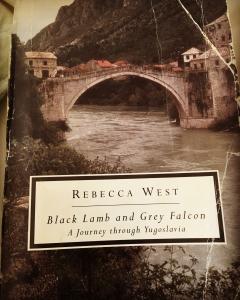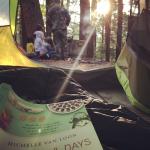Matt went out on his own and picked a color of paint for the porch that is not, um, quite what I had envisioned. He enthusiastically applied the first coat insisting over and over that it would darken and become exactly what I had described to him, and to myself. But twenty-four hours later it is as bright and alarming as ever and he has reluctantly agreed that we could maybe return Together to the paint store. But first he’s going to make waffles on the tiny waffle maker we just acquired. For waffles to become a regular occurrence around here we really need three or four of these minuscule contraptions.
The thing that I have to do is clean off the dining room table of all the camping items I have laboriously washed, some of them more than once, and clean the whole house because of course. It’s going to take me all day and by the end I’ll be irritated and full of venom. It’s going to be wonderful.
Anyway, I just read this curious paragraph in Black Lamb and Grey Falcon, which, you’ll be thrilled to know, I am meandering slowly through. The book is 1150 pages so I expect, if I just keep at it, to be done sometime around Christmas 2018. After letting it sit idle for twenty years, that’s a pretty hopeful forecast, I think.
What I like so much about this book, now that I am finally reading it, is not that West is right about everything, or anything at all, nor that there might be some impossible hope I could go to the Balkans and experience any part of what she describes, but rather that she thinks so hard about people, architecture, and landscapes, knows so much history that I have not even heard of, sees so much in the lines of a face, the shape of a hand, the expression of a passer by–I don’t even have one speck of her knowledge and gift of human observation. Her writing is fascinating. Rich. Deep. Enthralling.
For several sections leading up to this paragraph she has been trying to sort out why she doesn’t like Dubrovnik and didn’t even want to go there, even on the way to somewhere else. What she says makes me think of Evangelicalism and The West, and most especially This Week In The News.
Nothing could be more offensive to the eye, to the touch, or to common sense. The basin is strewn inside with extremely realistic fern-leaves and shells, among which are equally realistic eels, lizards, and snails, all enameled in their natural colors. It has the infinite elaborateness of eczema, and to add the last touch of unpleasantness these animals are loosely fixed to the basin so that they may wobble and give an illusion of movement. Though Dubrovnik is beautiful, and this object was indescribably ugly, my dislike for the second explained to me why I felt doubtful in my appreciation of the first. The town regarded this horror as a masterpiece. That is to say they admired fake art, naturalist art, which copies nature without interpreting it; which believes that to copy is all we can and need do to nature; which is not conscious that we live in an uncomprehended universe, and that it is urgently necessary for sensitive men to look at each phenomenon in turn and find out what it is and what are its relations to the rest of existence. They were unaware of our need for information, they believed that all is known and that on this final knowledge complete and binding rules can be laid down for the guidance of human thought and behavior. This belief is the snare prepared for the utter damnation of man, for if he accepts it he dies like a brute, in ignorance, and therefore without a step made towards salvation; but it is built into the walls of Dubrovnik, it is the keystone of every arch, the well in every cloister. They surrounded themselves with real art, the art that moves patiently towards discovery and union with reality, because to buy the best was their policy, and they often actually bought the best. But they themselves pretended that they had arrived before they had started, that appearances are reality. That is why Dubrovnik, lovely as it is, gives the effect of hunger and thirst. p. 265-266
And now I must arise and do all the cleaning. Have as pleasant of a day as you are in the way of having.












